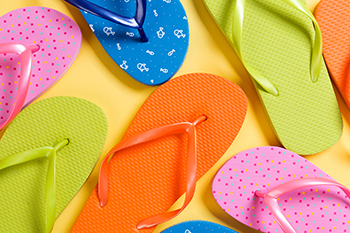

Flip-flops are popular summer footwear, offering ease and comfort on hot days. However, while they may be the preferred choice for many, it is essential to understand how they can affect your feet. The primary concern with flip-flops is their lack of support. They typically offer minimal arch support, and the thin sole provides little cushioning. This can lead to overuse injuries such as plantar fasciitis and Achilles tendonitis, as well as discomfort and fatigue during extended wear. Many flip-flops also have a lack of protection. Flip-flops expose your feet to hazards such as sharp objects, extreme heat, or slippery surfaces. This can result in cuts, burns, or accidents. Additionally, flip-flops often require a gripping motion of the toes to keep them in place, potentially leading to strain or imbalance in the foot's muscles. While flip-flops are perfect for short, casual outings, they should not be your primary footwear choice for long walks or activities that demand proper foot support and protection. Choosing shoes with better arch support and cushioning can help safeguard your feet against potential discomfort and injuries. If you would like more information about the negative effect wearing flip-flops can have on your feet, it is suggested that you speak with a podiatrist.
Flip-flops can cause a lot of problems for your feet. If you have any concerns about your feet or ankles, contact Dr. Edward D. Hutson from Easton, PA. . Our doctor will assist you with all of your foot and ankle needs.
Flip-Flops and Feet
Flip-flops have managed to become a summer essential for a lot of people. While the shoes may be stylish and easy to slip on and off, they can be dangerous to those who wear them too often. These shoes might protect you from fungal infections such as athlete’s foot, but they can also give you foot pain and sprained ankles if you trip while wearing them.
When Are They Okay to Wear?
Flip-flops should only be worn for very short periods of time. They can help protect your feet in places that are crawling with fungi, such as gym locker rooms. Athlete’s foot and plantar warts are two common fungi that flip-flops may help protect your feet against.
Why Are They Bad for My Feet?
These shoes do not offer any arch support, so they are not ideal for everyday use. They also do not provide shock absorption or heel cushioning which can be problematic for your feet. Additionally, you may suffer from glass cuts, puncture wounds, and stubbed toes since they offer little protection for your feet.
More Reasons Why They Are Bad for Your Feet
If you have any questions, please feel free to contact our offices located in Easton, and Northampton, PA . We offer the newest diagnostic and treatment technologies for all your foot care needs.